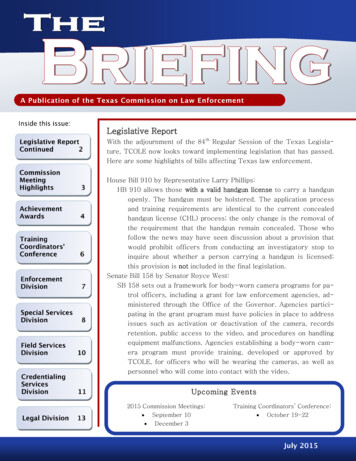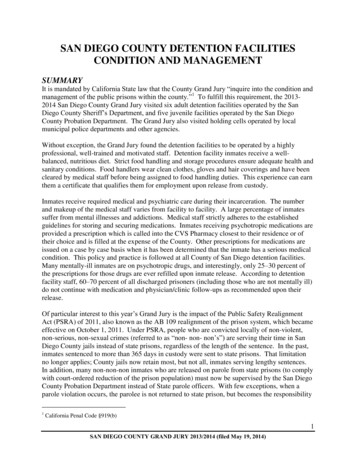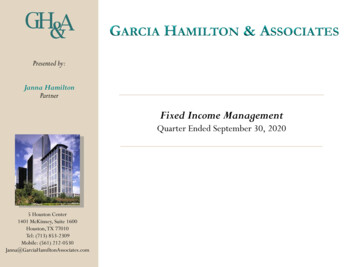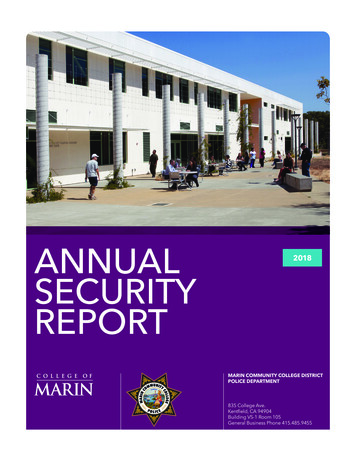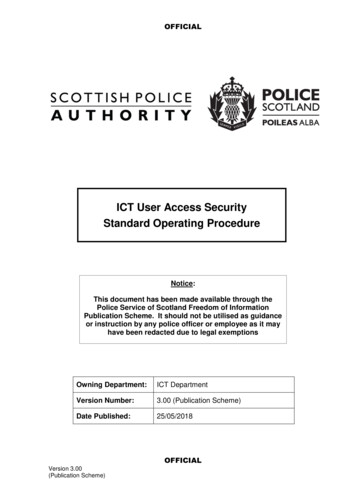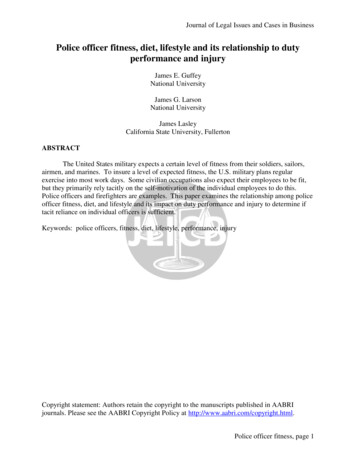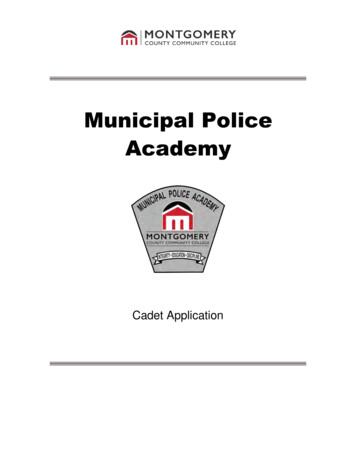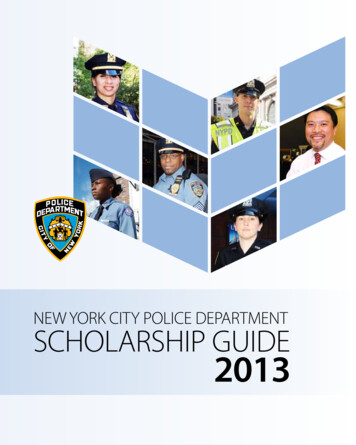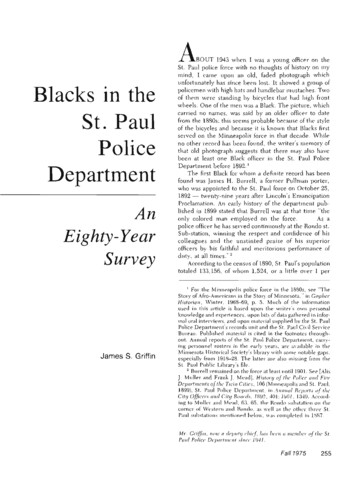
Transcription
Copyright 2016City of Chicago, Illinois. All Rights Reserved.CHICAGO POLICE DEPARTMENTDETECTIVE SELECTION PROCESSCANDIDATE PREPARATION GUIDEFOR BOTH EXAMINATION COMPONENTS:WRITTEN QUALIFYING TEST (WQT)ANDINVESTIGATIVE LOGIC TEST (ILT)February 10, 2016
NOTICE: A limited license is granted by the City of Chicago only to individual persons taking the2016 Written Qualifying Test and Investigative Logic Test examination components of theDetective Selection Process to make one copy only of the Candidate Preparation Guide for theiruse for study purposes only. Any other person who seeks to make or display a copy or copies ofthis guide for any additional or other use must apply in writing to the City of Chicago for permissionto make such use of this guide pursuant to a written license from the City of Chicago. Suchpermission may be granted and such use may be allowed by the City of Chicago pursuant to theterms of a written license, but only to the extent set forth in such license and only for suchadditional use(s). Sale or resale of a copy or copies of this guide without the express writtenpermission of the City of Chicago is strictly prohibited.
TABLE OF CONTENTSINTRODUCTION .1OVERVIEW OF THE WRITTEN QUALIFYING TEST .4Job Knowledge .4WQT INSTRUCTIONS AND PRACTICE QUESTIONS: JOB KNOWLEDGE (RECALL ANDREFERENCE SECTIONS).5Instructions .5Important Points to Remember .5Practice Questions .6Job Knowledge (Recall) Practice Questions.6Job Knowledge (Reference) Practice Questions .7Answers to Job Knowledge Practice Questions .8Job Knowledge (Recall) Answers .8Job Knowledge (Reference) Answers .9WQT EXAM SCORING INFORMATION .10OVERVIEW OF THE INVESTIGATIVE LOGIC TEST .11Application of Knowledge .11Investigative Assignments .12ILT INSTRUCTIONS AND MATERIALS.13General Instructions .13Application of Knowledge .13Materials and Instructions .13Important Points to Remember .14Investigative Assignments .14Assignment Materials .14Test Question Booklet .15Specific Instructions .15Important Points to Remember .16ILT PRACTICE QUESTIONS: APPLICATION OF KNOWLEDGE & INVESTIGATIVEASSIGNMENTS .19Practice Questions for Application of Knowledge .19Answers to Practice Questions for Application of Knowledge .21Practice Investigative Assignments .23Practice Test Question Booklet .24-i-
Answers and Explanations for Practice Investigative Assignments . 33ILT SCORING AND ELIGIBILITY INFORMATION .46STUDYING AND TEST-TAKING TIPS .47Preparing to Study for the Exams .47Learning Styles .47Study Approaches.48Collecting Materials .49Scheduling .49How to Read Effectively When Studying .50Reading Styles .50Preview the Material .50Read Actively .50Developing Practice Test Items .51Preparing for Testing .52Before the Test .52At the Start of the Test .53During the Test .53Strategies for Multiple-Choice Item Tests .54Strategies for the ILT Investigative Assignments .55APPENDIX ARECOMMENDED READING LISTAPPENDIX BLIST OF FORMSAPPENDIX CDETECTIVE CRITICAL JOB TASKSAPPENDIX DDETECTIVE IMPORTANT KNOWLEDGE AREAS, SKILLS, ABILITIES, ANDPERSONAL CHARACTERISTICSAPPENDIX ESAMPLE WQT REFERENCE MATERIALS BOOKLETAPPENDIX FSAMPLE ILT ASSIGNMENT MATERIALS-ii-
INTRODUCTIONThis Candidate Preparation Guide (“study guide”) is designed to assist you in preparing for thetwo examination components that are part of the Detective Selection Process, including:1. Written Qualifying Test (WQT) – a measure of important job knowledge that is requiredat entry to the Detective position; and2. Investigative Logic Test (ILT) – a measure of application of important knowledge,skills, abilities, and personal characteristics that are relevant to the critical duty areasperformed in the Detective assignments of Property Crimes, Violent Crimes, and SpecialVictims Unit.The goal of the Detective Selection Process is to select individuals who are qualified to performthe duties and responsibilities of Detectives in the Bureau of Detectives of the Chicago PoliceDepartment. Given the number of candidates participating, there is significant competition.Both the WQT and ILT exam components will be administered to all candidates on the sameday, Saturday 07 May 2016. The WQT will be administered first, followed by the ILT. The ILTwill be administered in multiple parts and will have an overall longer time limit for completionthan the WQT.The WQT is a pass/fail exam that is used to determine eligibility for subsequent components ofthe Detective Selection Process, including scoring of ILT examination and consideration forMerit nomination and interview. In other words, if you do not pass the WQT, your ILT will not bescored and you will not be considered for rank order or merit selection to Detective. ILT scoresdetermine candidates’ placement on the rank-ordered examination list.More specificinformation about test administration procedures will be provided in the Notice to Report thatyou will receive from the test administration vendor and on the day of the examination process.Please note that the full day of test administration may involve up to 6 hours of testing time, withan overall time frame of 8 hours required to include check-in and instructions for each part ofboth examinations.Candidates will be given breaks at appropriate times during the testadministration day.This guide provides suggestions and tips for helping you prepare for both exam components ofthe Detective Selection Process. Separate sections of the guide provide information specificallyrelated to the format and test item types that will be included in the Written Qualifying Test and-1-
the Investigative Logic Test. It also contains practice items representing the types of questionsthat will be included in the WQT and ILT. It is to your advantage to review these instructionsand practice the sample items provided, so that you are familiar with them on the day of testadministration. All test materials, questions, and scoring criteria were developed based ondiscussion and review with subject matter experts and senior command personnel in theChicago Police Department.In addition to the information about the specific exam components and related study tips, thisguide provides several appendices containing important information about the Detective positionand the overall selection process. Appendix A contains the Recommended Reading List of important referencematerials that may be included in the Detective WQT and ILT examination components. Appendix B contains a list of CPD forms, reports, or other types of documentationon which some of the test questions are based. It is to your advantage to be familiarwith the format, content, and purpose of these documents before the day of the exam. Appendix C contains a list of critical job tasks for the Detective assignments. Appendix D contains a list of the important knowledge areas, skills, abilities, andpersonal characteristics that are relevant for performing the Detective job. Appendix E contains a Sample Reference Materials Booklet to use with the practicetest items in the WQT Job Knowledge (Reference) section. Appendix F contains a set of Sample Assignment Materials to use with the practiceInvestigative Assignments in the ILT section.NOTE: Some of the forms developed for the ILT examination were created to resemblereports that are generated using CPD electronic systems. As such, the test versions ofthe forms may not be exact duplicates of the actual documents that would be generatedusing CPD systems. Do not be concerned with differences between these forms andthe actual forms or spend time finding problems in the format or completion of the formsthemselves. Accept the information provided in the forms, and the format of the forms,to be accurate for use in the ILT Investigative Assignments.All of the test materials were developed based on extensive job analysis of the Detectiveassignments (Property Crimes, Violent Crimes, and Special Victims Unit) in the Chicago PoliceDepartment, Bureau of Detectives. Job analysis activities included collection and analysis ofdata from job incumbents and review with Department subject matter experts and senior-2-
command personnel. Note that the information provided in Appendices C and D is intendedonly to describe the Detective job as performed by incumbents in the Detective assignments.For test preparation purposes, you should review the reference materials in theRecommended Reading List found in Appendix A that you are expected to be familiar with forthe Detective Selection Process. It is to your advantage to have studied the materials on theRecommended Reading List, have a working knowledge of these materials, and be able toapply the knowledge that is associated with these materials to realistic situations that Detectivesencounter on the job. Some of the Department directives and other references (i.e., sections ofthe Illinois Compiled Statutes and the Incident Reporting Guide) will be provided on the day ofthe exam for candidates to use as a resource when responding to test questions related tothese references as necessary. You also should be familiar with the list of common reports andforms that are used by Detectives to obtain, document, and share information, which is providedin Appendix B. Finally, review the instructions and practice questions in this study guide, whichare similar to the types of test questions that will be included in the WQT and ILT examcomponentsThe City wants each candidate for the Detective position to have an equal opportunity todemonstrate his or her capabilities. We encourage you to use the materials in this preparationguide and believe that you will find this information useful in helping you to do your best on theWQT and ILT examination components of the Detective Selection Process. -3-
OVERVIEW OF THE WRITTEN QUALIFYING TESTThe Written Qualifying Test (WQT) component of the Detective Selection Process presentsquestions about the job knowledge required to handle situations that are encountered byDetectives in the Property Crimes, Violent Crimes, and Special Victims Unit assignments. Youwill be asked to demonstrate your knowledge of the information included in the RecommendedReading List (provided in Appendix A) to respond to multiple-choice test questions. The WQTpresumes that you are knowledgeable about Department directives and procedures, laws andordinances, reference materials, and so forth, but does not require experience in havingperformed the Detective job.There are several types of questions that will be presented in the WQT. The test will includequestions that measure candidates’ ability to: (a) recall knowledge from memory and (b) useinformation found in job-related reference materials to answer questions about realistic jobsituations. The various types of test items are described below, and practice items for eachtype are included in following sections of this study guide.JOB KNOWLEDGEThe WQT test items will consist of questions regarding job-related information that you areexpected to know to perform the Detective job. You will be asked to answer multiple-choicequestions based on your knowledge of information contained in the materials identified on theRecommended Reading List (refer to Appendix A).Job Knowledge (Recall). For the test items in this section, you must recall from memory theinformation contained in the related references required to answer the questions.Job Knowledge (Reference). For the test items in this section, you will be able to look upinformation provided in related reference materials (i.e., selected Department directives,sections of the Illinois Compiled Statutes, and the Incident Reporting Guide) during the test toassist you in answering the questions.The following sections of this preparation guide further describe the instructions for the WQTand contain practice items pertaining to the Job Knowledge (Recall) and Job Knowledge(Reference) test sections.-4-
WQT INSTRUCTIONS AND PRACTICE QUESTIONS:JOB KNOWLEDGE (RECALL AND REFERENCE SECTIONS)The Detective WQT focuses on your ability to use information that is required on the job as aDetective. There will be two sections of Job Knowledge items: Job Knowledge (Recall) andJob Knowledge (Reference).Each will consist of multiple-choice items pertaining to jobknowledge that either (a) must be recalled from memory when needed on the job or (b) may belooked up in reference materials when needed on the job. For the Job Knowledge (Reference)section, you will be provided with portions of the materials (i.e., selected Department directives;sections of the Illinois Compiled Statutes; the Incident Reporting Guide) included on theRecommended Reading List (see Appendix A). You may use these materials during the testadministration to help you answer the questions in this section of the WQT.INSTRUCTIONSEach Job Knowledge multiple-choice test question has four response options, labeled A, B, C orD. You are to select the correct or best answer to each question. You will then mark youranswers to the test questions on a separate scannable answer sheet.IMPORTANT POINTS TO REMEMBERFor both of the Job Knowledge (Recall) and Job Knowledge (Reference) sections of the WQT: Mark only one answer for each question. If you have extra time available, review the questions and your answers. Make surethat: (a) you have answered all the questions, and (b) you have marked youranswers appropriately on the separate answer sheet. Plan your time. Answer the easy questions first, then go back and consider thequestions you skipped. Try not to spend excessive time looking up information in the reference materialsduring the Job Knowledge (Reference) section of the test. Again, it is to youradvantage to be familiar with the references on the Recommended Reading List, sothat you can locate information quickly. Your score will be based on the total number of questions answered correctly. It isto your advantage to answer every question, even if you need to guess.Check often to be sure that the number next to the row of circles you are marking onyour answer sheet matches the number of the question in your test booklet.-5-
PRACTICE QUESTIONSBelow are some practice questions pertaining to the Job Knowledge (Recall) and JobKnowledge (Reference) sections of the Detective WQT.Compare your answers to thoseprovided in the following section of the study guide, beginning on Page 8.JOB KNOWLEDGE (RECALL) PRACTICE QUESTIONS1.How long after a person is missing can that subject be reported to the Chicago PoliceDepartment as missing?A. 2 hoursB. 12 hoursC. 24 hoursD. There is no time constraint2.Which of the following persons, acting alone, can pronounce a body at the scene?A. An authorized member of the Crime LabB. A personal attending physician willing to sign the death certificateC. A Chicago Fire Department paramedicD. An exempt member of the Bureau of Detectives3.Detective Miller responds to the scene of an officer-involved shooting, in which OfficerJohnson has used his firearm to shoot an assailant. Detective Miller observes that OfficerJohnson’s weapon is holstered. Detective Miller must:A. ensure no member of any rank will handle, inspect, unload, or otherwise tamper withOfficer Johnson’s firearm prior to the arrival of Forensic Services Division personnel.B. take custody of Officer Johnson’s firearm, make it safe, and retain custody of theweapon until turned over to Forensic Services Division personnel.C. take custody of Officer Johnson’s firearm, make it safe, and inventory the weapon priorto turning it over to Forensic Services Division personnel.D. ensure that a member of the rank of Captain or above takes custody of OfficerJohnson’s firearm after it is made safe, but prior to the arrival of Forensic ServicesDivision personnel.-6-
JOB KNOWLEDGE (REFERENCE) PRACTICE QUESTIONSFor the following practice questions, you may refer to the Sample Reference Materials Bookletincluded in Appendix E. Note that Appendix E contains only those references that apply to thepractice items.The actual Reference Materials Booklet that you will receive duringadministration of the WQT will contain a larger number of selected portions of some of thereferences (i.e., Illinois Compiled Statues, Incident Reporting Guide, Department directives)listed on the Recommended Reading List (see Appendix A). You may refer to these referencematerials to respond to the questions in this section of the test.1.Which of the following felonies must be prosecuted within a specific amount of time afterthe offense is committed?A. ForgeryB. ArsonC. Aggravated batteryD. Reckless homicide2.3.Carl is upset because he has had no visitation with his son in several weeks. While armedwith a gun, Carl holds his mother-in-law in her home, demanding that his ex-wife deliver theson to him for a weekend visitation. Based on the facts given, which of the following wouldbe the most appropriate charge?A.Forcible detentionB.KidnappingC.Aggravated kidnappingD.Aggravated unlawful restraintIn an emergency situation, an eavesdropping device may be utilized without courtauthorization. An application for an order approving the previous or continuing use of aneavesdropping device must be made within a maximum of how many hours of thecommencement of such use?A.12 hoursB.24 hoursC.48 hoursD.96 hours-7-
ANSWERS TO JOB KNOWLEDGE PRACTICE QUESTIONSJOB KNOWLEDGE (RECALL) ANSWERSYou should have answered the Job Knowledge (Recall) practice questions as indicated below.Practice Question 1The answer to Practice Question 1 is “D. There is no time constraint.” This answer can befound in Department General Order G04-05 Missing/Found Persons, Section II, A.Practice Question 2The answer to Practice Question 2 is “B. A personal attending physician willing to sign a deathcertificate.” This answer can be found in Department Special Order S06-15 Processing andTransportation of Deceased Persons, Section IV, B, 1.Practice Question 3The answer to Practice Question 3 is “A. ensure no member of any rank will handle, inspect,unload, or otherwise tamper with Officer Johnson’s firearm prior to the arrival of ForensicServices Division personnel.” This answer can be found in Department General Order G03-0206 Firearms Discharge Incidents Involving Sworn Members, Section VIII, A.-8-
JOB KNOWLEDGE (REFERENCE) ANSWERSYou should have answered the Job Knowledge (Reference) practice questions as indicatedbelow.Practice Question 1The answer to Practice Question 1 is “C. Aggravated battery.” The answer to this question canbe found in 720 ILCS 5/3-5. This section is provided on Page 1 of the Sample ReferenceMaterials Booklet in Appendix E.Practice Question 2The answer to Practice Question 2 is “A. Forcible detention.” The answer can be found in 720ILCS 5/10-4. This section is provided on Page 8 of the Sample Reference Materials Booklet inAppendix E. Note that the ILCS sections where the other response alternatives may be foundare also included in the Sample Reference Materials Booklet.Practice Question 3The answer to Practice Question 3 is “C. 48 hours.” The answer can be found in 725 ILCS5/108A-6. This section is provided on Page 18 of the Sample Reference Materials Booklet inAppendix E.-9-
WQT EXAM SCORING INFORMATIONThe test administration contractors will be responsible for distribution, collection, and handling(e.g., copying, storing) of all test materials.The test administration contractor also will beresponsible for scanning WQT answer sheets and verifying scanned data files.The testdevelopment consultants will work with Chicago Police Department senior commandrepresentatives serving as subject matter experts for the Detective Selection Process to resolveany challenges to test questions and finalize the WQT scoring routine. Scoring of the WQT willnot occur on site at the testing location because of the large number of candidates expected toparticipate in the Detective examination and the need to verify the accuracy of scanning andscoring routines after any challenges to test questions are resolved.NOTE: Any information that would identify the name of a candidate is removed from the filesused for scoring. AT NO TIME during the scoring process will any of the test scorers or anyemployees of the City of Chicago see any candidate’s name associated with any test response.Each test will be scored based on the scoring criteria established by subject matter experts andsenior command personnel in the Chicago Police Department. Your final score that determinespass/fail results on the Written Qualifying Test will be the total points you obtain for all testquestions in both parts of the WQT. -10-
OVERVIEW OF THE INVESTIGATIVE LOGIC TESTThe Investigative Logic Test (ILT) component of the Detective Selection Process presentsquestions relating to investigations and other situations that are encountered on the job in theDetective assignments (Property Crimes, Violent Crimes, and Special Victims Unit) in theBureau of Detectives. The ILT is designed to measure the application of important knowledge,skills, abilities, and personal characteristics that are required to perform the critical duties of theDetective assignments, including administrative responsibilities and documentation; oral andelectronic communications; investigation of cases; criminal arrests, processing, and otheradjudication; collection and preservation of evidence; investigative interviews; and trialpreparation and court testimony.You will be asked to use the information and materialsprovided during the test, as well as your knowledge and abilities, to respond to various types ofquestions, including multiple-choice and open-ended questions. The ILT presumes that you areknowledgeable about general departmental procedures and the functions of Detectives, butdoes not require specific experience performing any of the Detective assignments.There are several types of questions that will be presented in the Detective Investigative LogicTest. The test questions for the ILT will be presented in separate parts, as described below.Each part of the ILT will be separately timed. The time limits are set with the intent to allowsufficient time for candidates to respond to all of the test questions. The parts of the ILT aredescribed below, and practice items for each type of test question are included in followingsections of this preparation guide.APPLICATION OF KNOWLEDGEThe test items in this part of the ILT will consist of multiple-choice questions that presentsituations similar to those that might be expected to occur during the course of a Detective’swork activities. You will be asked to apply relevant knowledge of Department directives, legalrequirements, and related policies, procedures, and techniques to respond to these types ofquestions.For these items, you will be asked to select the one response that best represents the next stepyou would take as a Detective faced with the situation. Keep in mind that in responding to somejob-relevant situations, often there may be no absolutely right or wrong action. However, someresponses are more effective than others as a next step to take in the investigative process orwhen handling other types of job responsibilities. You should choose the response that most-11-
closely reflects the action that you would take next if faced with each job-relevant situation as aDetective. Keep in mind that there may be other actions that could be taken in the situation,but you are asked to choose from among the three possible alternatives provided.INVESTIGATIVE ASSIGNMENTSThis part of the ILT will include several types of investigative assignments that are handled byDetectives in Property Crimes, Violent Crimes, and Special Victims Unit roles. The types ofassignments may include handouts, for which Detectives are given case reports that were takenby beat officers about incidents that require follow-up investigation. Detectives often receivethese handouts a day or two after the incident occurred. Another type of assignment involvesincidents where Detectives respond immediately to the scene to conduct their investigation. Inthese cases, Detectives often receive information directly from beat officers or others on thescene before any reports are completed.In other cases, a Detective’s assignment mightinvolve an incident that has already had some investigative activities completed by PatrolOfficers and/or Detectives, and your role as the Detective would be to follow-up or continue theinvestigation.This part of the ILT may present test scenarios and materials related to any of these types ofDetective investigative assignments.The information related to each assignment may bepresented in the form of case reports that have been completed and/or information that is told toDetectives at the scene of the incident by other individuals (e.g., beat officers, victims,witnesses, etc.).-12-
ILT INSTRUCTIONS AND MATERIALSGENERAL INSTRUCTIONSOn the day of test administration, you will be instructed as to exactly when each part of the ILTwill begin and end and how to document your answers for each part of the exam. The parts ofthe ILT will be timed separately, and you will be given periodic updates from the test proctorsabout how much time is remaining for each part.APPLICATION OF KNOWLEDGEThe Application of Knowled
2016 Written Qualifying Test and Investigative Logic Test examination components of the Detective Selection Process to make one copy only of the Candidate Preparation Guide for their use for study purposes only. Any othe
